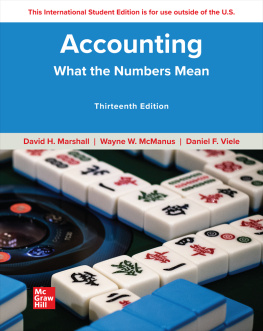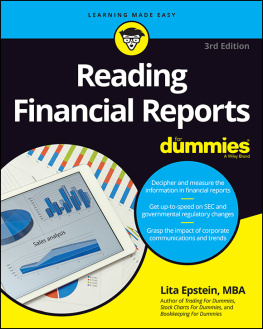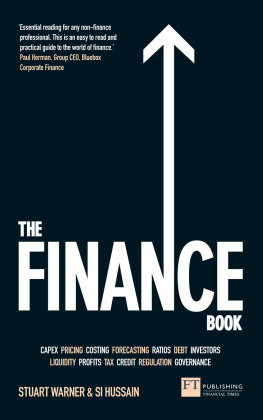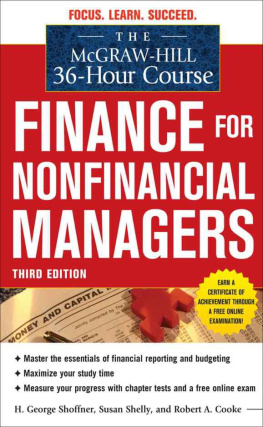Financial Intelligence
REVISED EDITION
Financial Intelligence
A Managers Guide to Knowing What the Numbers Really Mean
KAREN BERMAN
JOE KNIGHT
with JOHN CASE
HARVARD BUSINESS REVIEW PRESS
BOSTON, MASSACHUSETTS
Copyright 2013 Business Literacy Institute, Inc.
All rights reserved
Printed in the United States of America
10 9 8 7 6 5 4 3 2 1
The web addresses referenced in this book were live and correct at the time of the books publication but may be subject to change.
No part of this publication may be reproduced, stored in or introduced into a retrieval system, or transmitted, in any form, or by any means (electronic, mechanical, photocopying, recording, or otherwise), without the prior permission of the publisher. Requests for permission should be directed to , or mailed to Permissions, Harvard Business School Publishing, 60 Harvard Way, Boston, Massachusetts 02163.
Library of Congress Cataloging-in-Publication Data
Berman, Karen, 1962
Financial intelligence : a managers guide to knowing what the numbers really mean / Karen Berman and Joe Knight ; with John Case. 2nd ed., rev. and expanded.
p. cm.
ISBN 978-1-4221-4411-4 (alk. paper) ISBN 978-1-4221-4411-4 (e-book)
1. Financial statements. 2. Cash management. 3. CorporationsFinance. I. Knight, Joe, 1963 II. Case, John, 1944 III. Title.
HG4028.B2B422 2013
658.1511dc23
2012039043
The paper used in this publication meets the minimum requirements of the American National Standard for Information SciencesPermanence of Paper for Printed Library Materials, ANSI Z39.48-1992.
Karen dedicates this book to her husband, her daughter, and her circle of family and friends.
Joe dedicates this book to his wife, Donielle, and to the seven JsJacob, Jordan, Jewel, Jessica, James, Jonah, and Joseph Christian (JC).
CONTENTS
PREFACE
WHAT IS FINANCIAL INTELLIGENCE?
We have worked with thousands of employees, managers, and leaders in companies all over the world, teaching them about the financial side of business. Our philosophy is that everyone in a company does better when they understand how financial success is measured and how they have an impact on the companys performance. Our term for that understanding is financial intelligence. Greater financial intelligence, weve learned, helps people feel more committed and involved. They understand better what they are a part of, what the organization is trying to achieve, and how they affect results. Trust increases, turnover decreases, and financial results improve.
We came to this philosophy by different routes. Karen took the academic path. Her PhD dissertation focused on the question of whether information sharing and financial understanding on the part of employees and managers positively affects a companys financial performance. (It does.) Karen went on to become a financial trainer and started an organization, the Business Literacy Institute, devoted to helping others learn about finance. Joe earned an MBA in finance, but most of his experience with financial training in organizations has been on the practical side. After stints at Ford Motor Company and several small companies, he joined a start-up business, Setpoint Systems and Setpoint Inc., which manufactures roller coasters and factory-automation equipment. As chief financial officer (CFO) and owner of Setpoint, he learned firsthand the importance of training engineers and other employees in how the business worked. In 2003 Joe joined Karen as co-owner of the Business Literacy Institute and since then has worked with dozens of companies, facilitating financial intelligence courses.
What do we mean by financial intelligence? It isnt some innate ability that you either have or dont have. Granted, some people are better at numbers than others, and a few legendary folks seem to have an intuitive grasp of finance that eludes the rest of us. But thats not what were talking about here. For most businesspeopleourselves includedfinancial intelligence is no more than a set of skills that can be learned. People who work in finance acquire these skills early on, and for the rest of their careers are able to talk with one another in a specialized language that can sound like Greek to the uninitiated. Most senior executives (not all) either come out of finance or pick up the skills during their rise to the top, just because its tough to run a business unless you know what the financial folks are saying. Managers who dont work in finance, however, too often have been out of luck. They never picked up the skills, and so in some ways theyve been relegated to the sidelines.
Fundamentally, financial intelligence boils down to four distinct skill sets, and when you finish the book, you should be competent in all of them. They are:
Understanding the foundation. Managers who are financially intelligent understand the basics of financial measurement. They can read an income statement, a balance sheet, and a cash flow statement. They know the difference between profit and cash. They understand why the balance sheet balances. The numbers neither scare nor mystify them.
Understanding the art. Finance and accounting are an art as well as a science. The two disciplines must try to quantify what cant always be quantified, and so must rely on rules, estimates, and assumptions. Financially intelligent managers are able to identify where the artful aspects of finance have been applied to the numbers, and they know how applying them differently might lead to different conclusions. They thus are prepared to question and challenge the numbers when appropriate.
Understanding analysis. Once you have the foundation and an appreciation of the art of finance, you can use the information to analyze the numbers in greater depth. Financially intelligent managers dont shrink from ratios, return on investment (ROI) analysis, and the like. They use these analyses to inform their decisions, and they make better decisions for doing so.
Understanding the big picture. Finally, although we teach finance, and although we think that everyone should understand the numbers side of business, we are equally firm in our belief that numbers cant and dont tell the whole story. A businesss financial results must always be understood in contextthat is, within the framework of the big picture. Factors such as the economy, the competitive environment, regulations, changing customer needs and expectations, and new technologies all affect how you should interpret numbers and make decisions.
But financial intelligence doesnt stop with book learning. Like most disciplines and skill sets, it must not only be learned, it must also be practiced and applied. On the practical side, we hope and expect the book will prepare you to take actions such as the following:
Speak the language. Finance is the language of business. Whether you like it or not, the one thing every organization has in common is numbers and how those numbers are tabulated, analyzed, and reported. You need to use the language to be taken seriously and to communicate effectively. As with any new language, you cant expect to speak it fluently at first. Never mindjump in and try something. Youll gain confidence as you go.
Ask questions. We want you to look at financial reports and analysis with a questioning eye. Its not that we think anything is necessarily wrong with the numbers you see. We merely believe it is tremendously important to understand the what, why, and how of the numbers you are using to make decisions. Since every company is different, sometimes the only way to figure out all those parameters is to ask questions.
Next page








